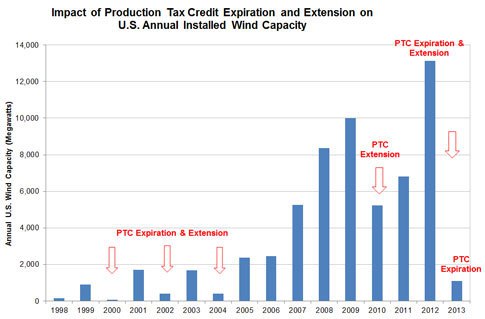As Blue Wave Fizzles to Purple Haze, There Are Reasons for Optimism Amid Midterm Results
It turns out there was no blue wave or red wave, and the purple haze that settled over the country in the wake of the midterm elections gives me reasons for optimism moving forward regarding energy and environmental policy in the coming years.
1.Senate gains could mean we will finally end the handouts for wind and solar:
As you may know, wind and solar are huge recipients of federal tax subsidies, and these subsidies are the main reason why anyone invests in wind or solar. Fortunately, last night’s results maybe these subsidies may finally go the way of the dodo bird.
The wind Production Tax Credit (PTC) has been “temporary” since it was first implemented in 1992 and the investment tax credit (ITC) for solar as been “temporary” since 2007. Since then, each has been renewed. In the case of the PTC, it has been renewed several times, each time spurring large investments in the wind industry (see below):

The PTC and ITC were almost repealed during the debate over the tax reform bill, but the language was removed because Iowa Senator Chuck Grassley, a Republican, fought to keep the tax credits alive. With only a slim majority in the Senate, Republicans were forced to grease Grassley’s palm to get the broader package approved.
Now, with Republicans picking up Senate seats in Indiana, Missouri, North Dakota, and potentially Florida, Republicans may have enough wiggle room to finally let the PTC expire in 2019, and the ITC in 2021.
Getting rid of these subsidies is incredibly important because they hide the true cost of building wind and solar facilities, providing cover for state politicians seeking to enact renewable energy mandates. Wind and solar are nearly useless sources of energy because they only provide energy when the weather cooperates, but the grid must be able to provide electrons rain or shine.
Letting these subsidies expire will go a long way in curing what currently ails energy policy across the country, and hopefully the expanded Republican majority will them them go.
2. Voters in Washington State Reject a Carbon Tax:
Activist groups in Washington sought to make the Evergreen State the first state to impose a tax on carbon dioxide emissions. This proposal went up in flames with 56.3 percent of the voters opposed the initiative, while 43.7 percent supported the measure.
According to the Washington Examiner:
Washington’s plan would have required fossil fuel companies to pay $15 per ton of carbon dioxide they release into the atmosphere, beginning in 2020. The tax would increase by $2 each year until 2035, reaching around $55 per ton. The carbon pricing proposal appeared on the ballot as a fee, not a tax, to make the initiative more appealing to voters, and for technical reasons.
Money earned from the fee — roughly $1 billion annually by 2023 — would have been spent on clean energy and climate change resilience projects, such as wind and solar plants, mass transit, and energy efficiency improvements to buildings.
3. Arizona Voters Shoot Down the 50 Percent Renewable Energy Mandate By a 70 to 30 Margin.
Voters overwhelmingly rejected Proposition 127, a ballot measure that would force electric companies to get half of their energy from renewable sources by 2030, the Associated Press projected Tuesday night.
California billionaire activist Tom Steyer’s political group NextGen America spent heavily to get the measure on the ballot and win over voters, but it wasn’t enough to win.
4. Four Cheers for Fracking! Proposition 112 Fails in Colorado.
A proposal that would have effectively banned fracking in Colorado was defeated 57 to 43 after the oil and gas industry waged an aggressive campaign to fend of the ballot measure that seemed like it would pass a few months ago. Oil and gas are large employers in the state, and this proposition would have sent a lot of investment to Wyoming.
Conclusion
Despite a shellacking in Minnesota, conservatives nationwide have reason for optimism. The gains in the Senate are encouraging and the loss in the House was not anything out of the ordinary for a midterm election. There’s still a lot of work to do, but we are still a lot better off than we were four years ago.